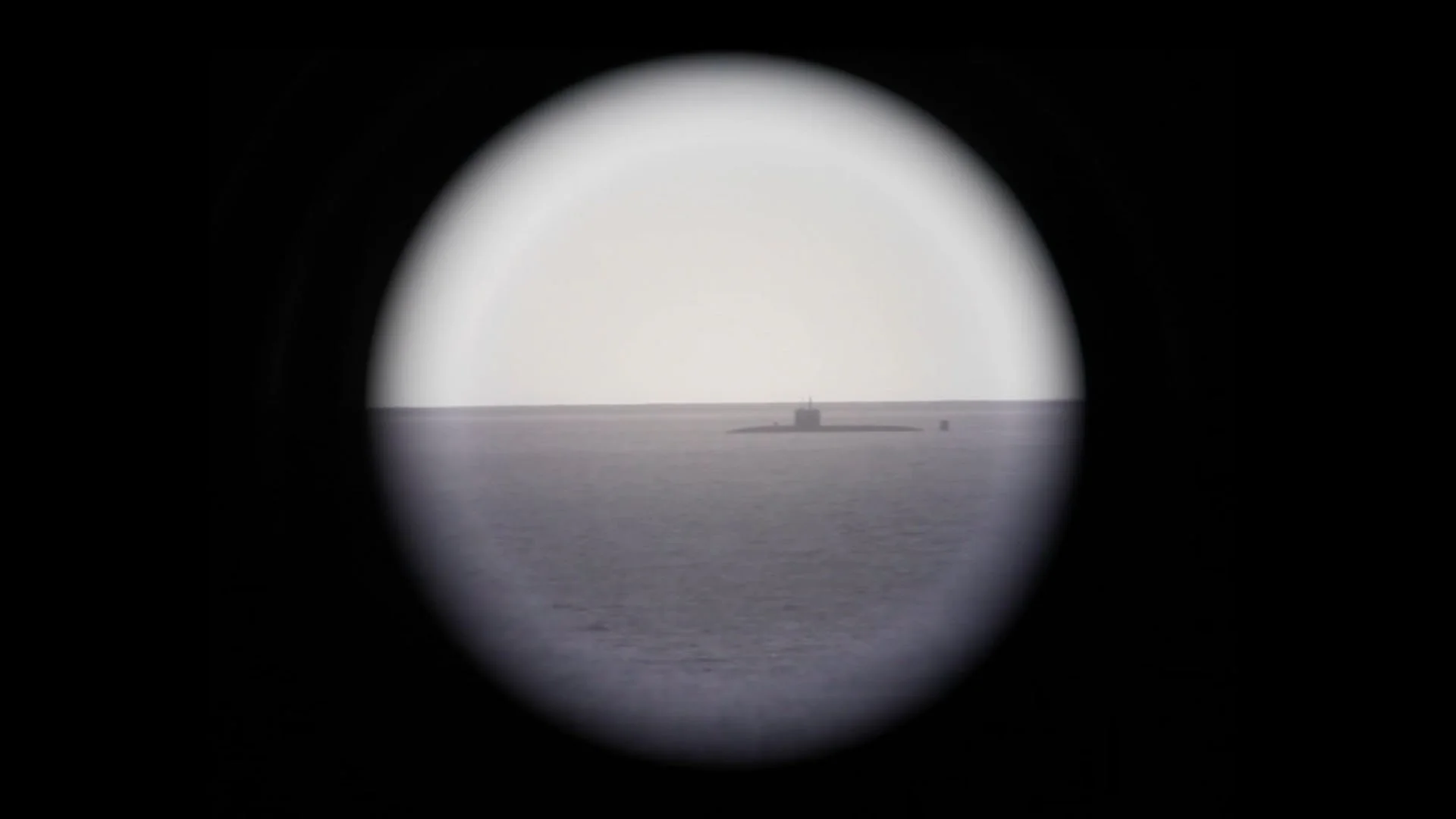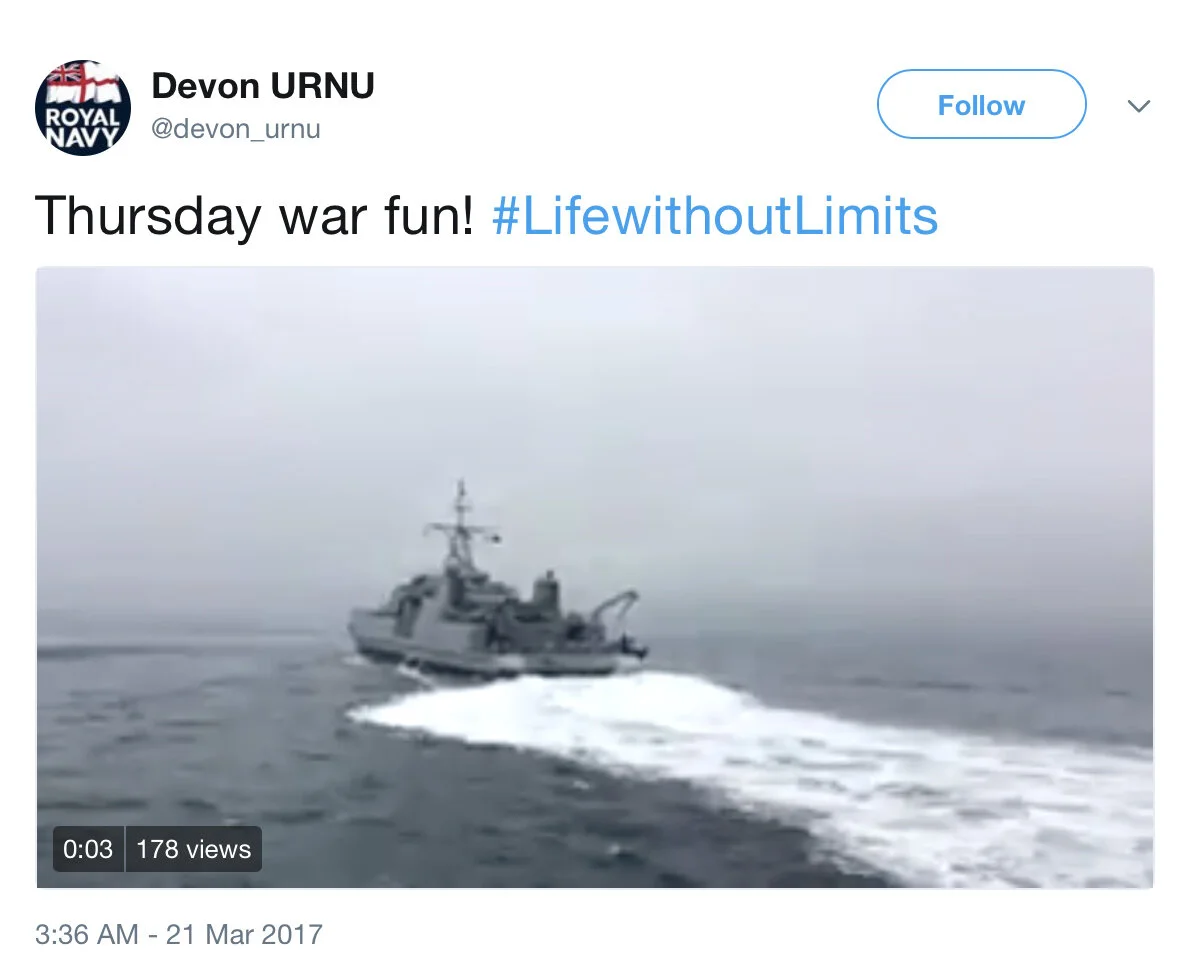Margareta Kern, ‘Thursday War’, HD video still, work-in-development (2024). Courtesy of the artist.
Thursday War is a moving image and research project by Margareta Kern that captures the menace amid mundanity of naval exercises in Cornwall at a time of heightening military tensions. Filmed from the artist’s kitchen window over seven years, the circular images show the warships and submarines gliding along the horizon, their slow violence made palpable by the haunting soundtrack. This prescient and urgent work draws our attention to the role that simulation and coloniality play in perpetuating militarism and forever wars.
Currently in development, the project includes an expanded moving-image installation with a specially commissioned sound score developed in collaboration with a renown New York City-based cellist and composer Julia Kent and an award-winning Bosnian-born, German-based soprano Ljiljana Winkler. Supported by the Arts Council England Developing Your Creative Practice Grant 2023/2024.
For the past seven years Kern has been filming the naval exercises from her home with a camera lens commonly used by the birdwatchers. Unlike the birdwatchers, Kern keeps the circle of the lens visible, evoking military images seen through the rifle’s viewfinder or a submarine’s periscope, and recalling cinema’s own history of imbrication with war and violence [the first portable motion camera was made out of a revolving rifle able to ‘shoot’ twelve frames of birds in flight per second].
The resulting circular images show the warships and submarines gliding slowly along the horizon. There is a sense of threat in the air, a threat that remains unrealised, yet very present. It is not quite clear where the footage is taken, suggesting that the boundaries of real and simulated wars are not always clear, and that wars elsewhere have already been pre-enacted here.
At the same time, ‘here’ is situated quite clearly. Kern explores the way everyday militarism renders its violence imperceptible, through the geopolitics of living near the largest naval base in Western Europe: HMNB Devonport, Plymouth – a storage site for thirteen decommissioned nuclear submarines full of radioactive waste, and a base for the warships.
A ‘Thursday War’ is the colloquial name given in the Royal Navy for the weekly war-fighting exercises that used to culminate on a Thursday. According to NATO, whose warships and submarines regularly take part in the wargames off the coast of Cornwall, the forces are asked to respond to a fictitious scenario that resembles what might occur in real life. Kern’s work questions how military fictioning perpetuates myths and wars.
I started filming the military training exercises in 2015, soon after moving to Cornwall. As a person displaced by war, witnessing the war games from my home sits uneasy with me. This unease prompted many questions, such as why are these warships in my kitchen and how come you don’t see them?
I did not expect them here, in my living room. They glide from one edge of the window frame to another, moving slowly through the water. They disappear behind the table sliding under a pile of books with titles like - [*]Legacy of Violence - Time Is a Mother – Гравитације - small white monkeys – Undrowned - The Blue Split Compartments - How To Wash a Heart – Drift – Uhvati Zecа - only to appear at the other side unharmed. Unchanged. They come into my living room uninvited. They return most days. I seem to be the only one noticing them.I saw a submarine once. It appeared at one end of my window and moved in slow motion across. In a straight line. No sudden turns. No smoke. No sound.Others shrug when I ask if they come into their living rooms, and say no, they haven’t noticed them, how many were there, what did they look like? I explain that they are hard to miss, they are dark and ominous, steely warships that come unannounced, how come you don’t see them? Then the helicopters turn up. I hear them, before I see them. Deep throbbing sound moves the sand under my floor boards reconfiguring the house that I call home, that sits on the edge of the ocean, the ocean that spills into it.
Text by Margareta Kern, 2023[*] Caroline Elkins (2022) ‘Legacy of Violence, A History of the British Empire’; Ocean Vuong (2022) ‘Time Is a Mother’; Senka Marić (2022) ‘Gravitacije’ (eng. Gravitations); Sophie Collins (2022) ‘small white monkeys’; Alexis Pauline Gumbs (2020) ‘Undrowned, Black Feminist Lessons from Marine Mammals’; Andrea Brady (2021) ‘The Blue Split Compartments’; Bhanu Kapil (2020) ‘How to Wash a Heart’; Caroline Bergvall (2014) ‘Drift’; Lana Bastašić (2019) ‘Uhvati Zeca’ (eng. Catch the Rabbit).
**Most recently, a ‘Thursday War’ scenario was revamped to include what the Royal Navy describes as “a new four fictitious nations with competing domestic and international ambitions requiring naval intervention under the banner of ‘Operation Mayflower’ (2023)’. The use of the term Mayflower to describe such war games is deeply disturbing and yet unsurprising - for a critical decolonial reading of Mayflower and settler-centered mythology surrounding it to this day, please see Plymouth-based North Study Group Mayflower Myths.
To follow the development of the project please join my mailing list or contact me to view an extract of the work.



